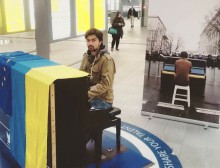During the events of Maidan, Markian Matsekh from Lviv made the project of “cultural revolution” – he brought a piano to the Presidential Administration and played Chopin it front of the Berkut riot police. Nowadays, he is once again engaged in cultural diplomacy. This time he is doing it in The Netherlands, in order to bring positive result on the referendum concerning the Association Agreement between Ukraine and the EU.
For several days he has been performing at railway stations in Dutch cities: Breda, Maastricht, Utrecht, The Hague, and Amsterdam. He did not have to buy a piano this time – they are installed at every railway station in The Netherlands, and anyone can play on them. To bring Ukrainian context and to convey his message to the Dutch, Matsekh placed a well-known revolutionary shot of him, and unfurled flags of Ukraine and the EU on the instrument. His performances continued until the referendum. The Day interviewed Markian Matsekh about his initiative.
What was your motivation when you decided to go to The Netherlands?
“I have many things that bring me closer to The Netherlands. My mom lives here, I have friends in the country, and since I was 13 I have often come to this country. And I know a little about it. Two years ago, during the times of the ‘cultural revolution’ behind the piano, the Dutch media most actively responded to it: they published photos, recorded interviews, and invited me to programs. Then I had established the communication with their media, and they have a certain image of me; so I thought that I have an opportunity to draw attention to a contemporary issue – the referendum on the Association Agreement between Ukraine and the EU – and convince the Netherlanders to say ‘yes.’ The stakes for Ukraine are quite high, so I could not abstain from somehow influencing the decision when I was able to do so. At first I did not know what should I do specifically, but I knew that some action should be taken. Then I was lucky to get acquainted with Stem Voor organization, which helps the Ukrainian voice to reach the minds of the Netherlanders. Then we had an idea to make this tour. They knew that the Dutch railway stations have pianos, and that Dutch people would rather listen to local media than national; this depoliticized picture of me and a piano will play well against populism. And so we started to work in tandem.”
What do you think of the performances?
“I’m glad I did what I could and should do. I already talked to many media in The Netherlands, and I continue to do so to convey our message; I managed to convince a few people personally. The fact is that many Dutch are still undecided, they have too little information. And this cultural action and other measures to support Ukraine should have reached out to them.
“People are different: someone would recognize the Maidan’s Piano, someone else would be surprised, but most of the people were curious about the performance.”
What is the role of Dutch media in the coverage of Ukrainian issues?
“An important point is the media that write about it without politicization of the issue, describing only the cultural aspect. But there are those who shift the emphasis, equivocate, and distort the meaning behind what people are voting for. Many people think that the agreement will benefit only the government, that many Ukrainians disagree, and that it could start a civil war. Another negative argument they put forward is the alleged flow of immigrants. The emphasis is shifted, and it is difficult to fight this – so we have to turn to culture that can solve this issue. Piano reminds people that Ukrainians had risen on Maidan for this purpose, and that the priority and importance of the European integration has not changed.”







